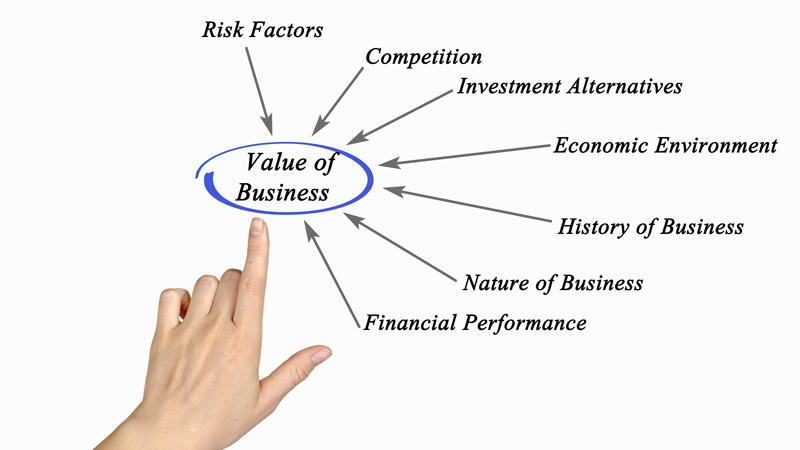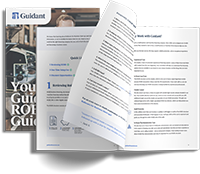What’s a small business valuation? And why — or when — do you use them? Both are excellent questions, especially if you’re a current or aspiring small business owner.
First, let’s break down what a business valuation is. Business valuations place an economic value on your company using specific methods (more below). In many ways, it’s similar to valuing a home during the selling process. You don’t set that value in a vacuum. Instead, you use various methods, such as comparables in your neighborhood, county assessor’s records, and the value of any improvements you’ve made. Business valuations work the same way — but let’s take a closer look.
How Do Small Business Valuations Work?

The small business valuation process usually uses your company’s financial reporting and records. The minimum includes balance sheets showing assets, liabilities, and shareholders’ equity; income statements showing revenue, expenses, and net profits; and cash flow statements showing cash remaining after payment of debts, operating expenses, and any investments.
Small business owners generally need to provide at least two years’ worth of these financial statements and at least one forecast year in the valuation process. In many cases, three years’ worth of statements and three years’ forecasts are required.
When it comes to business valuations, it’s usually best to consult a professional, such as an accountant or lawyer. And in many situations, you’re legally required to draw up contracts or other agreements before going through the business valuation process.
Keep in mind that a business valuation is different from a business appraisal! An appraisal may utilize your own financial records, but outside appraisers will delve more deeply into the company. Appraisers will visit the company to examine whether your assets match your statements. A business valuation accepts your own financials. Appraisals are often required for specific situations, such as bankruptcy or divorce proceedings.
Why Do a Small Business Valuation?

Now that you know what a business valuation is (in a nutshell), let’s review why you might need to do a business valuation! No matter the stage in your business journey, a business valuation can come in handy — and is often necessary.
Selling the Company
If you’re selling your business or a segment of it, you’ll likely need to have a business valuation done. The valuation sets a mutually agreeable price for both you and the buyer.
For small business owners, the business valuation tells them how much profit they may have coming their way. And a business valuation can help inform your decisions if you’re considering selling!
A business valuation can also highlight methods of maximizing the profit before the sale, such as focusing on profitable lines and minimizing those less profitable.For potential buyers, a valuation reassures them that the asking price is fair. For both of you, a valuation can be the basis of any price or other negotiation.
Looking to sell your business? Here are the Top 3 Best Ways to Find a Buyer for Your Business.
Merging with Another Company
If you’re considering merging with another company, a business valuation can inform your decision in several ways. Here, a valuation can also set a mutually agreed-upon price or set the stage for negotiations.
The valuation can also be the basis of considerations about what role you and any employees will play in the merged company, reasonable compensation levels, and similar factors.
Franchising Your Business
A business valuation is likely required if you choose to franchise your business. It sets a reasonable value for potential franchisees to pay for a franchise opportunity, including initial upfront costs and any annual payments.
A business valuation can also set benchmarks on revenue, profit, and cash flow for a successful franchise, which helps grow the franchise.
Financing to Support Growth
It’s common for successful businesses to need financing to support their growth and expansion. Many financing methods exist, but almost all require a valuation. Banks and other loan lenders will want one to determine your viability, reasonable loan amounts, and ability to repay a loan.
Do you plan to issue equity shares? If yes, a valuation is often is necessary to set a reasonable price on them. And you’ll also need a valuation if you’d like to go the debt financing route, issuing bonds in your company.
Looking for business financing? See How to Finance Your Small Business for a rundown on the latest business financing solutions and trends.
Adding Owners
At times, business owners may want to add other owners to create partner ownership, sweeten the deal to bring in employees with needed expertise, or reward long-time employees. You can also add owners to reduce the burden on yourself in terms of time pressure or duties.
Owners generally will want to know the economic value of the business at the end of the valuation process, particularly if they’re putting up money to become an owner. This may be required legally for the drawing up of contracts.
Estate Planning
If you plan to pass on the business or proceeds from the business to your heirs, it’s a valuation issue. Why? It can help you divide assets as you see fit. And if you have multiple children, you can use a business valuation to divide the business equally among them.
A business valuation issue can also help you minimize taxes. If your business is worth under $12.06 million, the current Federal exemption level, it won’t be subject to Federal estate tax. But a hefty estate tax will be levied if it’s over that amount. (Some states also have an estate tax, so it’s prudent to consult accountants or estate planners on state tax strategies.)
Once you know the valuation, you consult an accountant about tax strategies. One potential strategy is selling off pieces of the business to lower its value below the exemption threshold. Another, if you are planning to leave business proceeds to your heirs, is to gift them annually instead. People can currently give $16,000 to their heirs every year without triggering a gift tax. The amount will rise to $17,000 in 2023.
Insurance for the Business
To insure your business, you may need a business valuation. Insurers will peg the amount of insurance to a valuation issue, such as the company valuation, equipment, physical plant, inventory, and more. A valuation helps show the actual economic value of your business. Without one, you can run the risk of being underinsured or overinsured.
If you’re underinsured, you may suffer if you ever need to file an insurance claim. Suppose your inventory is damaged by a natural disaster, such as a hurricane or flood. In that case, you’re unlikely to receive full insurance claim compensation if the insurance company didn’t insure for the full value of that inventory.
If you’re overinsured, you’re likely paying too much in insurance premiums, draining your cash flow unnecessarily. Over time, premiums on over-insurance can add up to a significant expenditure.
How do you know the economic value of your business? See How to Value a Business.
Small Business Valuation Methods

When should you have a business valuation performed? Whenever you are considering any of the above actions, you should consider valuing your business. Note that the valuation of businesses changes over time, so you want to peg the valuation as close to determining your actions as possible. And when you’re ready to evaluate your business, you can start by choosing which valuation methods to use.
There are several different small business valuation methods. But the best method for your business depends on you and your industry or sector. In some industries, it can be helpful to use several approaches to get a full range of valuations.
Asset Method
In an asset valuation, you determine your assets’ current fair market value. Then, you subtract the fair market value of your assets from the fair market value of the assets. Calculating assets and liabilities include tangible assets (real estate, inventory, and capital equipment) and intangible assets (brand, patents, trademarks). The value of intangible assets is more subjective than that of tangible assets, so this category is more often subject to negotiation.
Do you use a balance sheet? Balance sheets can help you keep track of your assets and more. See How to Make a Balance Sheet in 5 Easy Steps — with a FREE Balance Sheet Template included!
Income Method
The income approach utilizes estimates of future cash flow using a discounted cash flow method or a capitalization of earnings method. In a discounted cash flow method, your cash flow forecasts are used, which are discounted into the future. In a capitalization of earnings method, cash flow forecasts are also used — but a capitalization rate is used rather than a discount rate.
If you are selling, merging, or franchising your company, you and the other party must agree on the underlying assumptions and methods used in an income approach.
Market Method
The market approach bases its determination on sales of companies similar to yours, using public or private data. In other words, it analyzes what the market has paid for comparable companies. The market approach valuation can use multiple factors similar between your company and others, including vertical, size, profitability, and growth.
Multiple analyses provide a more complete picture of your company’s value. Depending on the information you provide or the nature of your business, one approach in an estimated business valuation may make more sense than the others.
Note that all three basic methods may use earnings before interest, tax, and amortization (EBITA) in addition to cash flow and other metrics. It’s also widely thought to give a more precise picture of profitability, as it excludes your cost of capital. So, comparing your business to competitors is easier.
Let Guidant Financial Help
Business valuations are often complex and overwhelming, especially if you’re a busy small business owner. Guidant Financial’s business valuation services can help!
With expertise in small business, our financial experts can provide an estimated business valuation, financing assessment, in-depth industry report, and more. And you’ll always have your dedicated valuation specialist supporting you with all your valuation and assessment needs.
Pre-qualify today for business financing, or call us at 425-289-3200 to book your FREE business consultation!

















